They"ve spent years teaching at College of the Holy Cross and advancing research in their respective fields. Now, eight faculty members have been promoted to the rank of full professor. Learn more about their scholarship, their time at Holy Cross and what they're most proud of.
Alison Bryant Ludden, psychology
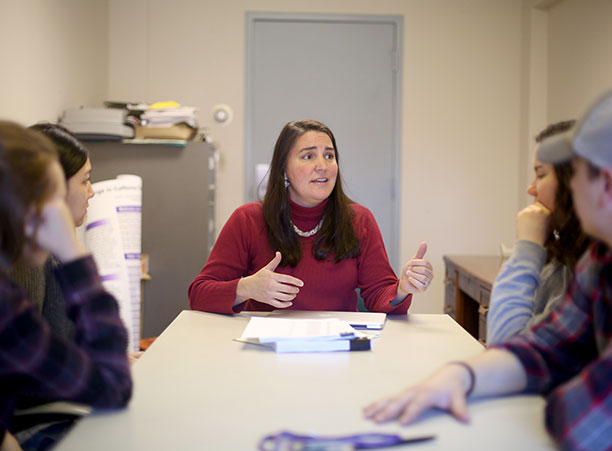
Alison Bryant Ludden, of the psychology department, earned a B.A. in psychology from Colgate University, a M.A. in developmental psychology from the University of Michigan, and a Ph.D. in education and psychology from the University of Michigan. Her research broadly focuses on adolescent development, motivation and schooling, and health behaviors. In particular, her work examines the contexts of and reasoning behind adolescents’ use of alcohol, cigarettes, marijuana and caffeine. She has been a member of the Holy Cross faculty since 2004.
At this point in your career, what is your proudest accomplishment?
The success that I have experienced in classroom and in my research laboratory with students. Every fall, I look forward to sharing research studies and my knowledge about adolescent development with new students and seeing where our discussions take us. I’m proud that my work has been well-received in academic journals and by colleagues in my field, but even more so that I’ve been able to collaborate with many students and share with them these satisfying experiences of having our work recognized and contributing to the growing knowledge about adolescent health behaviors.
You've taught a number of Montserrat courses in your time at the College, and are the director of Montserrat. What is your favorite thing about teaching the newest members of the Holy Cross community?
When first year students come in, they aren’t sure what to expect but they are excited to take everything in and they do so with enthusiasm. Over the course of the year they face unexpected challenges and can be overwhelmed, but they continue to engage deeply both in the classroom and beyond. By the end of the year, students have settled in and found themselves more securely in terms of their academic and social identities. I really enjoy the process of helping them find and have more confidence in their voice over the course of the year, whether it be in writing papers in my class or articulating their perspectives in conversations with others.
Sarah Luria, English
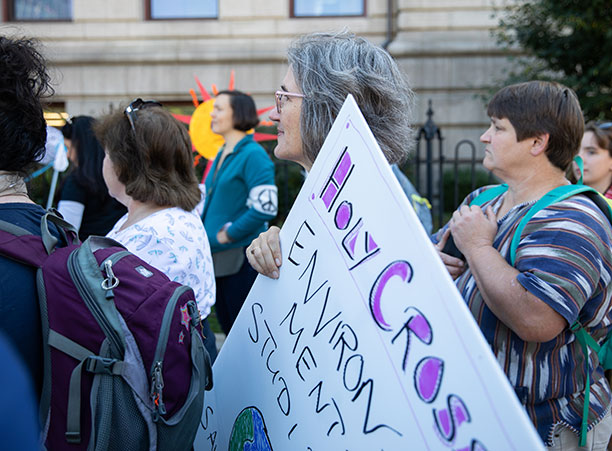
Sarah Luria, of the English department, earned an A.B. in English from the University of California, Berkeley and a Ph.D. in English from Stanford University. Her research focuses on 19th century American literature, geography and landscape studies, environmental studies, American studies, 19th century political oratory and rhetoric, and sentimentalism. She has been a member of the Holy Cross faculty since 1998.
At this point in your career, what is your proudest accomplishment?
Being at the heart of some exciting, constructive, conversations in American studies, geography, and environmental studies, all of which answer the need for academics to not remain siloed in their different disciplines but bring their different views and insights together. Right now I am most excited to use that creative interdisciplinary conversation to address climate change.
Large portions of your scholarship focus around the environment — in fact, you're the director of the environmental studies department here at the College. Where does that interest come from?
I am always most interested in how literature has helped to change the world. I define literature to mean any work of great writing or oratory, fiction or non-fiction, speech, letter or advertisement. Literature is not only philosophical, psychological, ethical, spiritual and entertaining. It is instrumental. It makes things happen. It inspires unthinkable creations. Environmental studies is the perfect stage on which to combine the insights from science and social science with the power of stories to shape and change our relationship to our environment. When it comes to understanding and addressing climate change, we need to have all kinds of scientists, and social scientists at the table—but we better have some historians and great creative artists and writers and scholars there, too.
Jennie Germann Molz, sociology and anthropology
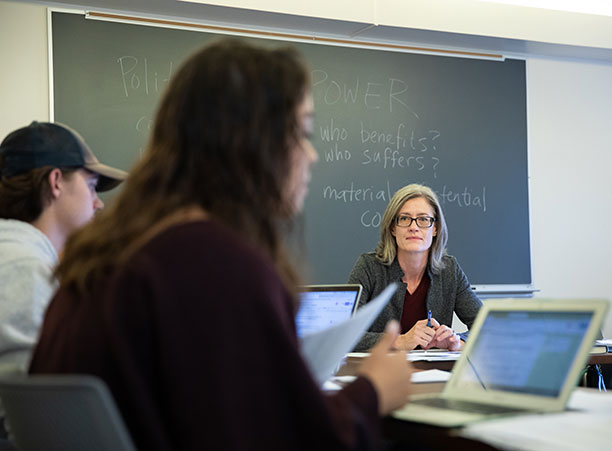
Jennie Germann Molz, of the sociology and anthropology department, earned a B.A. in the Plan II Liberal Arts Program from the University of Texas at Austin, an M.A. in popular culture studies from Bowling Green State University, and a Ph.D. in sociology from Lancaster University. She is a founding co-editor of the journal Hospitality & Society and was a Fulbright scholar at the University of Lapland. Her research focuses on mobilities, travel and tourism, technology, educational travel, mobile families, cosmopolitanism, globalization, and critical hospitality studies. She has been a member of the Holy Cross faculty since 2007.
At this point in your career, what is your proudest accomplishment?
In all honesty, I’m always thinking forward to the next thing. Right now, I’m most excited about the research I’m doing on digital nomads and emotional tourism, but especially about the book I have coming out next year on mobile families who "worldschool" their children while traveling the globe.
Much of your scholarship focuses on tourism. What are your big takeaways about tourism throughout your years of research?
What makes tourism and mobile lifestyles such an intriguing focus for me is the fact that people often assume these practices are on the margins of society — that tourism is an escape from everyday life — when in fact, these leisure mobilities are deeply reflective of broader cultural values, emotional climates and social transformations of our time. Travelers are often the first to experiment with new technologies, the first to navigate shifting geopolitical conditions, and the first to pioneer new forms of work and play. So I see the phenomena of travel and tourism mobilities not as something set apart from everyday life, but as a lens for understanding the hopes and anxieties, structures of power, and social changes that are shaping life in late modernity.
Karen Ober, biology
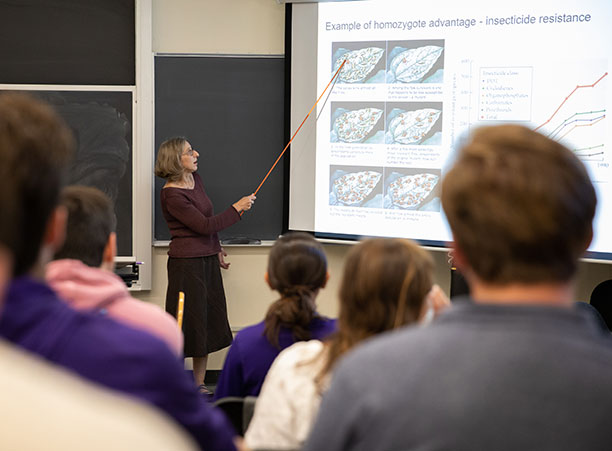
Karen Ober, of the biology department, earned a B.S. in biology from the University of Michigan, Ann Arbor and a Ph.D. in insect science from the University of Arizona, Tucson. Her research focuses on exploring molecular and morphological diversity in insects. She has been a member of the Holy Cross faculty since 2004.
At this point in your career, what is your proudest accomplishment?
At this point in time, I am most proud of being awarded promotion to full professor at Holy Cross. Holy Cross has afforded me the opportunity to grow as a scholar and teacher. I am proud to see how far I have come in those areas of my work.
Why should students be interested in studying insect diversity?
More than half of the described species of life on earth are insect species. Insects are crucial components of many ecosystems and food webs. Some insects eat crops or food in storage; others spread diseases. Certain insects are helpful by producing products we can use (honey or silk), by pollinating crops or by attacking pest insects. Plus, they’re just really cool!
Mathew Schmalz, religious studies
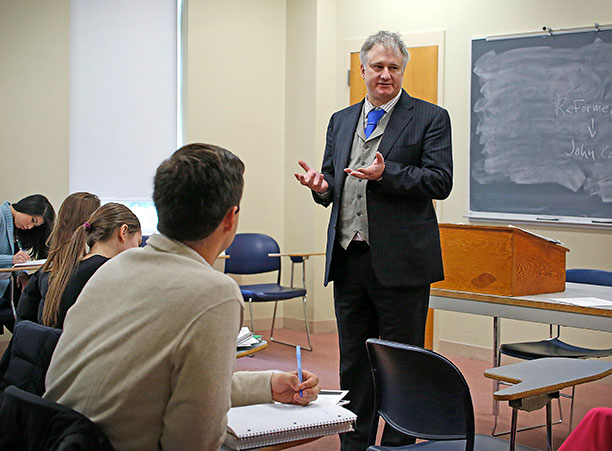
Mathew Schmalz, of the religious studies department, earned an A.B. in religion from Amherst College, an M.A. in religious studies from The Divinity School, and a Ph.D. in history of religions from The Divinity School. His research focuses on global Catholicisms, Hinduism, Catholic esotericism, Mormonism, Jehovah's Witnesses, religion and violence, and religion and the erotic. He has been a member of the Holy Cross faculty since 2005.
At this point in your career, what is your proudest accomplishment?
While it wasn't really my accomplishment, I think working for six years as director of the College Honors Program has been the most meaningful part of my career thus far. It was wonderful to see students develop their intellectual interests in such powerful ways.
You're trained in the Jesuit pedagogy. How does this training come into play in the classroom?
Interestingly enough, it was Peter Faber's discussion of "discernment of spirits" that was most influential to me. Reading the class and sensing its tone is so important for running seminars.
Lorelle Semley, history
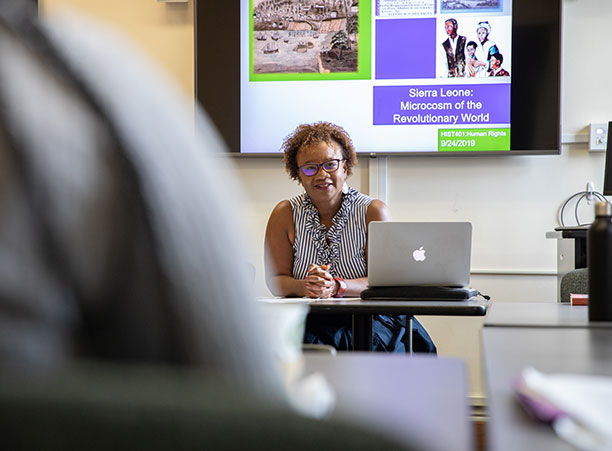
Lorelle Semley, of the history department, earned a B.S. in French from Georgetown University, an M.A. in African studies from Yale University, and an M.A. and Ph.D. in history from Northwestern University. Her research focuses on modern West Africa, French imperialism, gender and the Atlantic world. She has been a member of the Holy Cross faculty since 2011.
At this point in your career, what is your proudest accomplishment?
I am most proud of the range of work that I have published on West Africa, the Caribbean and Europe. I did not imagine that I would write on this variety of topics when I first began my career.
You're the director for the Center for Interdisciplinary Studies here at the College. What type of interdisciplinary work do you do?
As an Africanist scholar, I was trained to use a range of sources in my research and teaching. At the beginning of my career, that interdisciplinary approach meant using ethnographic methods and engaging with religious studies in my first book. For my second book, I drew on legal history, urban studies, and visual art. For my next book, I will continue to develop my analytical skill using legal and urban history and visual art studies and hope to incorporate digital mapping. Perhaps more challenging, I would like to write a work of historical fiction as part of a project I'm working on about Bordeaux. Often we work with gaps in the historical sources for African and African diaspora history and I would like to find some creative ways to address those silences.
Ann Sheehy, biology
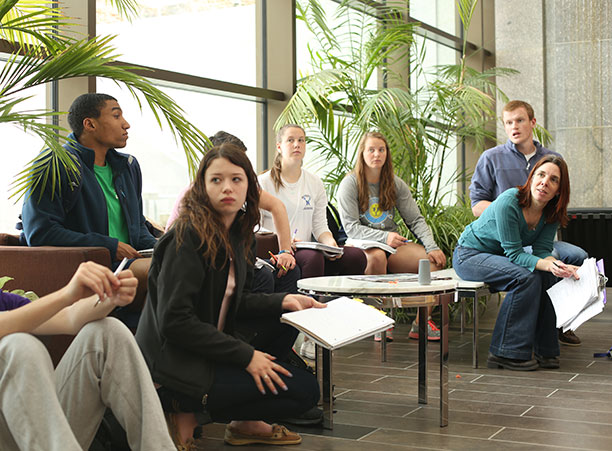
Ann Sheehy, of the biology department, earned bachelor of arts degrees in both biology and chemistry from Kalamazoo College and a Ph.D. in immunology from Johns Hopkins University School of Medicine. Her research focuses on the cellular immune response to HIV invasion. She has been a member of the Holy Cross faculty since 2005.
At this point in your career, what is your proudest accomplishment?
Over the last 14 years I have been fortunate to work closely with a variety of students in my own research lab. We work side-by-side, grapple with the science and present our work at conferences all over the world. I often get to know my research students quite well. Accompanying them on their journeys through undergraduate education and postgraduate exploration is uplifting. Many of these students are just beginning to realize how truly talented they are and, as that realization unfolds, when they receive offers from various graduate schools or employers, it is a great joy to watch them seize the incredible opportunities they have earned.
You've held a number of research positions in various labs. How does your lab experience play into your teaching?
What I cherish most about research is the intellectual curiosity at its core and the great freedom that discovery research allows. In my courses, I do my best to convey to my students this passion for diving into the unknown, tackling a difficult question one experiment at a time. There must be a willingness to take risk and even fail. Research is often about looking for the next path after a failure and it is often in these moments of frustration that the next step reveals itself. I also want all of my students, even students who are not science majors, to understand how data are collected and analyzed. While science cannot answer all of life’s questions, the ability to incorporate information with a scientific mindset is an invaluable addition to the toolbox.
Jessica Waldoff, music
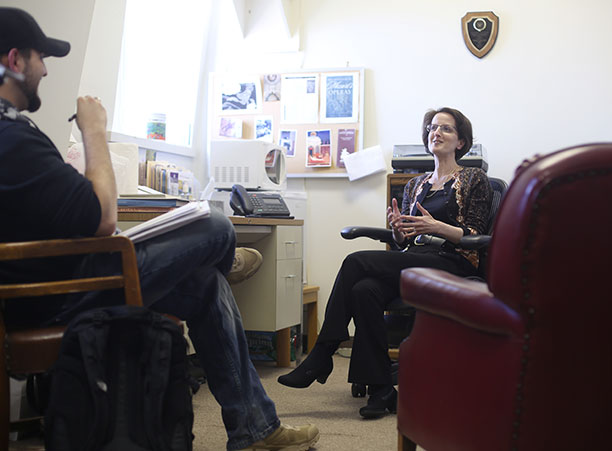
Jessica Waldoff, of the music department, earned a B.A. in music and English from Amherst College and an M.A. and Ph.D. in musicology from Cornell University. She is the author of “Recognition in Mozart’s Operas” (Oxford University Press, 2006/2011) and many scholarly articles written for books, journals and European opera houses. She has been a member of the Holy Cross faculty since 1995.
At this point in your career, what is your proudest accomplishment?
I am most proud of my students’ accomplishments. I learned very early that some of the most important teaching, learning and mentoring takes place outside of the classroom: in College honors theses, Fenwick Scholar projects, and independent tutorials. As the graduate studies adviser in music, I have helped many students follow their passions into careers beyond Holy Cross. Just this year, two of my former students who went on in musicology received tenure at first-rate colleges and universities, another received her Ph.D. and a fourth won the prestigious Rome Prize. Nothing gives me a greater sense of accomplishment than seeing my students succeed!
A significant part of your scholarship focuses on Mozart. What interests your students the most about this composer?
Mozart is one of the most celebrated and best-loved composers of all time. His music is heard around the globe — not just in concert halls, but in a host of popular venues: in films, on television, in novels, in video games, while you’re shopping. Mozart’s story has always had the power to amaze: He was the most famous child prodigy of his day, composing his first works for piano at 6, his first symphonies at 8 and his first operas at 12. In the years that followed, he pushed the envelope in every musical genre. When I teach Mozart, I invite students to think about how he lived and worked in an age defined by enlightenment and revolution — a time not so very unlike our own.

